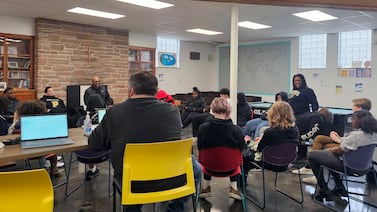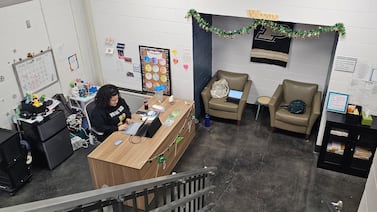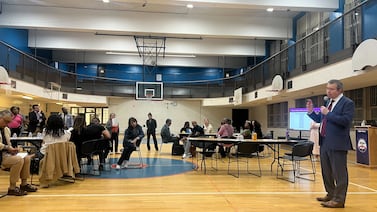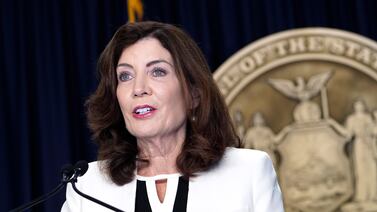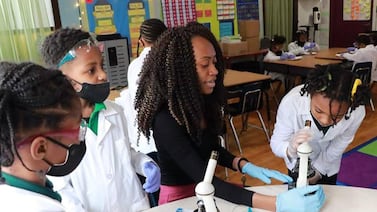A federal judge dismissed a class action lawsuit this week that attempted to force the city’s education department to fast-track makeup services for students with disabilities in response to pandemic-related disruptions.
The lawsuit, filed in November 2020 by the nonprofit Advocates for Children, claimed that tens of thousands of students with disabilities missed crucial services and instruction after the city’s school buildings shut down. In the immediate aftermath of the pandemic, city officials struggled to provide functional remote learning devices for every student, leaving some without access to instruction. Some services such as physical therapy were extremely difficult to deliver virtually.
Students with disabilities have a right to “compensatory services” if their school doesn’t provide the specialized instruction or therapies listed on their Individualized Education Program or IEP. But the process for seeking those makeup services in New York City has faced extreme backlogs, with cases often taking hundreds of days to resolve despite the legal limit of 75 days. In its lawsuit, Advocates for Children argued the city should create a streamlined process due to the urgent need for makeup services.
A New York federal judge rejected that argument this week and dismissed the lawsuit. He noted that none of the families involved in the suit attempted to use the existing administrative process, which involves requesting an “impartial hearing” with an officer who reviews the evidence and adjudicates the dispute.
“That they want to speed up the process of obtaining compensatory education does not change the fact that the administrative process provides the exact relief sought,” wrote the judge, Andrew L. Carter Jr. “Plaintiffs must exhaust their claims before coming to federal court.”
Advocates for Children was “disappointed by the decision and are considering all options,” the organization’s litigation director, Rebecca Shore, wrote in an email. She did not immediately say whether the organization planned to appeal.
The ruling comes as federal education officials have urged school districts to proactively determine whether students with disabilities need additional services after two years of interrupted schooling. Many school districts are grappling with whether and how to provide additional tutoring, therapies, or other special education services. Federal officials say some districts have incorrectly assumed they don’t have to provide make-up services because the pandemic-related disruptions to student services weren’t their fault.
New York City has taken some steps to catch students up, including a program launched this school year that offers additional instruction and related services such as occupational therapy outside the regular school day.
“We are committed to providing students with disabilities in DOE schools additional services to address unfinished learning disrupted during the pandemic by proactively developing and implementing a special education academic recovery services program this year,” wrote Nathaniel Styer, an education department spokesperson.
Styer said the city strives to provide services without going through the hearing process and will continue to assess students’ needs during IEP meetings, which are held with parents and school officials to determine what services students are entitled to.
Jesse Cutler, a lawyer who handles special education cases at Skyer Law, said it is rare for the city to proactively offer compensatory services during students’ IEP meetings. And the reviews of the after-school and Saturday programs have been mixed, with some parents saying the sessions haven’t been specifically tailored to their child’s needs.
Advocates said that without a streamlined process for offering makeup services, families will get tangled in the existing impartial hearing process or may simply forgo support to which they’re entitled.
“These existing procedures are time-consuming and often favor families able to afford lawyers, leaving economically disadvantaged students behind,” wrote Isabella Rieke, a spokesperson for Advocates for Children. “This is especially true now, given how backlogged and overburdened the city’s special education impartial hearing system already is.”
The judge wrote that he was “sympathetic to the fact that some families may face some difficulty navigating the administrative hearing process,” but emphasized that the court should give some allowances for delays resolving cases owing to disruption caused by the pandemic.
As recently as December, the impartial hearing office had a backlog of 16,000 cases, as the number of complaints filed has grown considerably in recent years. But delays were pervasive even before the pandemic hit. In February 2020, the average time it took to close a case was 259 days. (City and state officials did not immediately provide more recent figures.)
City officials have launched an overhaul of the impartial hearing system, though Cutler said there are still significant delays and some cases are taking 150 days to be placed before a hearing officer.
“That’s five months. That puts us into the end of the summer before a hearing officer is even assigned,” he said. “Kids are back in school. If there’s a 265 day delay, that’s problematic.”
Kalyn Belsha contributed.
Alex Zimmerman is a reporter for Chalkbeat New York, covering NYC public schools. Contact Alex at azimmerman@chalkbeat.org



